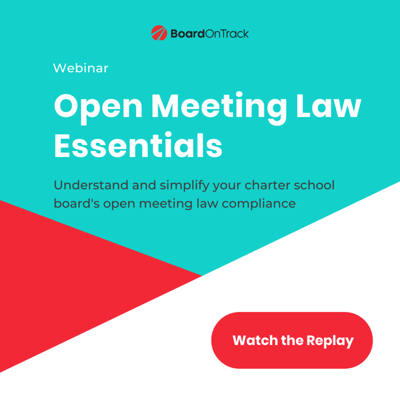
What Is an “Open Meeting Law”?
Whether or not you’re new to charter school governance, you’ve asked this question at some point: What is an “Open Meeting Law”? Or, more likely, you’ve wondered if your charter school’s board can really be effective while maintaining compliance.

Open meeting laws (sometimes referred to as “sunshine laws”) vary slightly from state to state.
Open meeting laws are designed to help ensure that the public sees the work of the governing bodies of public institutions.
Charter schools are public schools, making board members public officials and the board a governmental body. So each charter school board must comply with their state’s Open Meeting Law.
Typically, the law requires charter school boards to hold open discussions regarding their actions (unless a specific exemption permits an executive session), inform the public of all meeting times, and keep accurate records of the proceedings.
Most charter school boards are unclear about how to comply with their state’s Open Meetings Law.
The most important thing is to understand the intent of the law.
Don’t be paralyzed from doing good work because of the law itself.
Remember that your board’s composition is constantly changing.
People need periodic training and orientation around the Open Meetings Act.
Take these first steps towards complying with your state’s Open Meeting Law
Specific technical questions should be addressed to your school’s legal counsel.
But, to get you going in the right direction, here are some general steps towards complying with the Open Meetings Law:
- Make sure that every board member and your CEO has a copy of the applicable Open Meeting Law.
- Include a discussion of compliance with the Open Meeting Law as part of your new board member orientation.
- Annually provide the full board with a refresher on the Open Meeting Law, and ask the organization’s legal counsel for guidance with specific questions.
- Annually, ask the organization’s legal counsel to review your procedures for complying with the Open Meeting Law. This review should include reviewing the board minutes, procedures for posting your meetings, and meeting protocols.
Again, remember the spirit of the law is that the public sees the board doing its work in public.
Don’t let that stop you from having open, honest, and even difficult conversations. Let the public hear the tough questions you are asking and see the hard choices you are making as a charter school board.
The more everyone understands what it takes to deliver exceptional public education, the better off we all will be. Observing a public charter school board in action is an excellent way to educate interested members of the public.
Want to learn more about how to ensure your board operates transparently and complies with your open meeting laws?
Start with these recommended articles and resources:
What Should Your Charter School’s Board Meeting Minutes Look Like?
Fix Your Board Meetings, Strengthen Your Board
What It’s Like To Take Meeting Minutes In BoardOnTrack
Keeping You On Track: The Brown Act + BoardOnTrack

Sam Falk
Sam Falk was the Chief Customer and Product Officer at BoardOnTrack and is based in Concord, Massachusetts.
